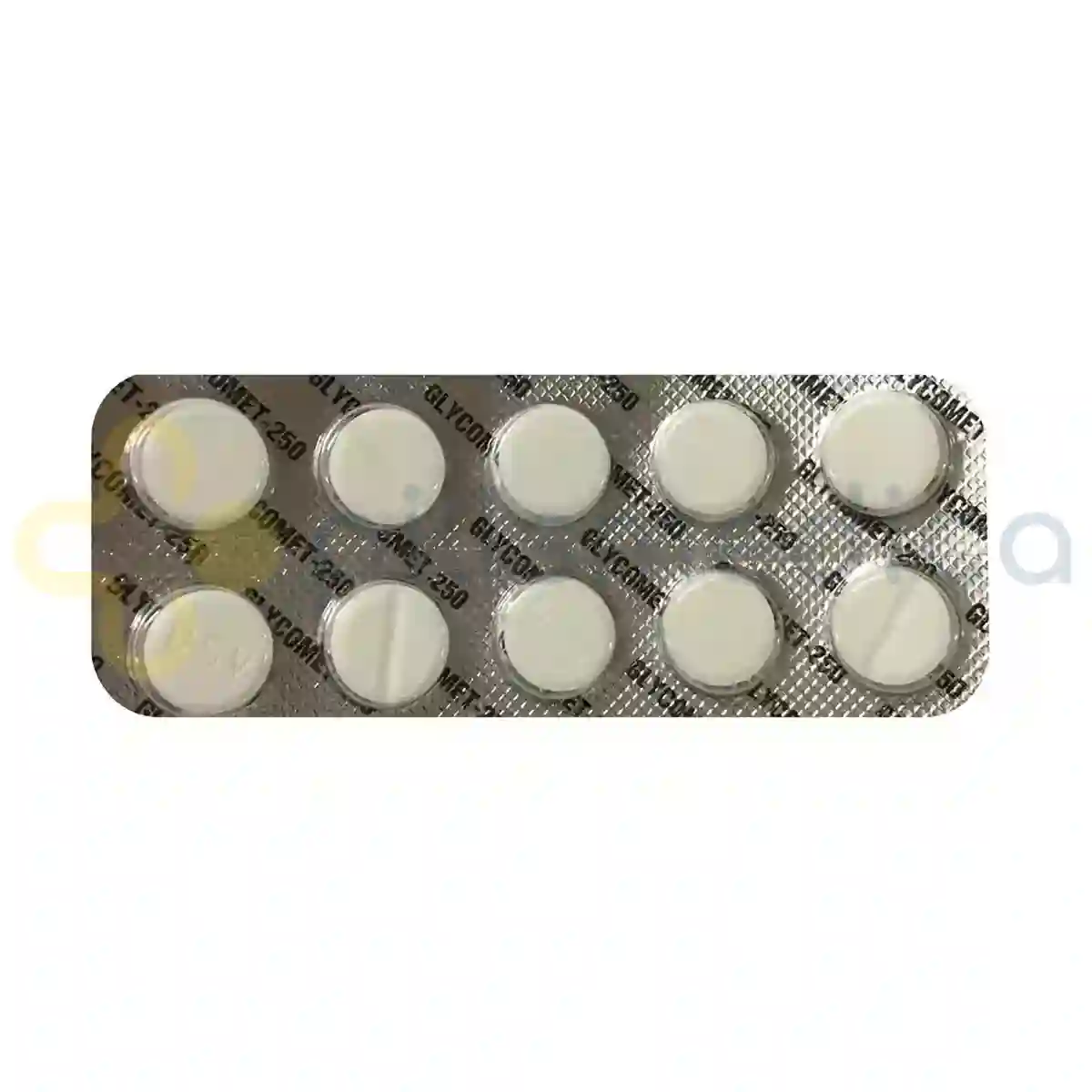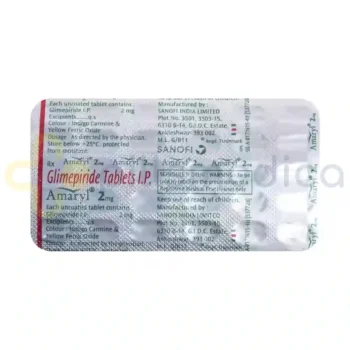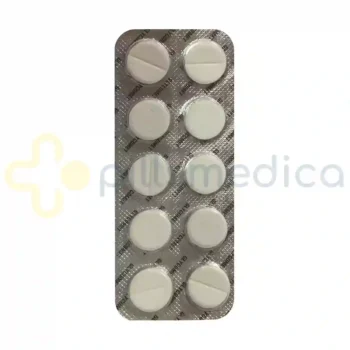Glycomet 250MG Tablet (10’s)
Glycomet 250MG Tablet is a diabetic medication primarily used for the management of type 2 DM (type-2 diabetes mellitus). The active ingredient in this medication is Metformin, a biguanide derivative that acts as an antihyperglycemic agent. Metformin works by decreasing hepatic glucose production and intestinal absorption of glucose, effectively helping to control blood sugar levels. This medication is usually prescribed in conjunction with an appropriate diet and physical exercise regimen for more effective diabetic control. Glycomet 250MG functions as a pivotal tool in managing non-insulin dependent diabetes mellitus.

Essential Drug Facts
| Dosage form | Oral Tablet |
|---|---|
| Chemical Class | Biguanides Derivative |
| Habit Forming | No |
| Systemic Category | Endocrine & Metabolic System |
| Action Class | Biguanides |

What are the Indication / Medical Uses of Glycomet 250MG Tablet (10’s)
Glycomet 250MG Tablet is primarily indicated in the management of type-2 diabetes mellitus, particularly in overweight patients, when dietary modifications and exercise alone do not result in adequate glycemic control. It also helps to prevent the serious complications of diabetes, including kidney damage, heart disease, and blindness. Additionally, Metformin is used in the treatment of polycystic ovary syndrome (PCOS).

How Does Glycomet 250MG Tablet (10’s) Benefit You?
Glycomet 250MG Tablet has the primary benefit of controlling high blood sugar levels which helps prevent damage to the kidneys, eyes, nerves, and blood vessels. Keeping blood sugar at a consistently stable level also helps lower the risk of a heart attack or stroke. For a comprehensive treatment plan, Glycomet 250MG Tablet should be used alongside lifestyle changes such as a balanced diet and regular exercise.
.svg)
Glycomet 250MG Tablet (10’s) Action Mechanism
Metformin, the active ingredient of Glycomet 250MG, works by inhibiting the production and release of glucose from the liver, reducing the absorption of glucose in the intestine, and improving the body’s sensitivity to insulin. This serves to lower the amount of sugar in the blood, helping to keep glucose levels within an optimal range.

How should Glycomet 250MG Tablet (10’s) be used
Glycomet 250MG Tablet ought to be taken by mouth, usually one to three times a day with meals. The exact dosage will be determined by the doctor (healthcare provider) based on the patient’s response to treatment, and the severity of the condition. Patients are advised not to crush, chew, or break the tablet but swallow the tablet whole for optimal results.

When is the best time to take Glycomet 250MG Tablet (10’s) ?
The usual practice is to administer the Glycomet 250MG Tablet during or just after meals to reduce the potential for gastrointestinal side effects. If the dose is taken once daily, it is usually taken with the evening meal.

How does it affect me if I overdose?
An overdose of Glycomet 250MG Tablet can result in a condition known as lactic acidosis. Symptoms may include severe drowsiness, severe nausea, vomiting, diarrhea, rapid breathing, slow or irregular heartbeat, or stomach pain. This is potentially fatal and requires immediate medical attention.
.svg)
How does it affect me if I miss a dose?
Missing a dose of Glycomet 250MG Tablet can lead to erratic blood sugar levels. If a dose is missed, it should be taken as soon as remembered. However, if it is nearly time for the next dose, then the missed dose should be skipped. Avoid taking double doses to make up for missed medication. Stick to the prescribed dose and schedule, and consult a healthcare professional if you have any concerns.

Drug Adverse Reactions of Glycomet 250MG Tablet (10’s)
Common side effects associated with Glycomet 250MG Tablets include gastrointestinal reactions such as indigestion, nausea, vomiting, and diarrhea. Other reactions may consist of metallic taste in the mouth, weight loss, and mild rash. A rare but severe side effect is lactic acidosis.

Glycomet 250MG Tablet (10’s) Tablet is contraindicated in following conditions
Glycomet 250MG Tablet is contraindicated in individuals with: Severe renal impairment (eGFR < 30 mL/min/1.73 m²). Acute or chronic disease which can lead to tissue hypoxia. Acute alcohol intoxication or alcoholism. Hypersensitivity to Metformin or any other component of the medication.

Glycomet 250MG Tablet (10’s) Safety Warnings and Precautions

Concomitant use of alcohol and Metformin increases the risk of lactic acidosis.

Patients with a known allergy or hypersensitivity to metformin or any component of the formulation.

While Metformin does not usually result in harmful effects on the fetus, it should be used during pregnancy only when the potential benefit justifies the potential risk to the fetus.

Glycomet 250MG is not recommended for use in children below ten years due to a lack of data.

Metformin is excreted into human milk and is generally acceptable to use during breastfeeding.

Metformin does not usually affect the ability to drive or use machines, but if you do experience dizziness or other side effects, avoid potentially hazardous tasks such as driving.

Patients with severe kidney disease are advised against using Metformin.

Lung conditions can affect the oxygen level in the body and thereby increase the risk of lactic acidosis while on Metformin.

Metformin should not be used in individuals with severe liver disease as it may result in increased risk of lactic acidosis.

Use of Metformin should be cautious in patients with heart diseases due to a potential increased risk of lactic acidosis.

Interactions between Glycomet 250MG Tablet (10’s)
Metformin, the active component of Glycomet 250MG, can interact with several medications such as corticosteroids, Beta-2 agonists, Diuretics, ACE inhibitors, etc. These interactions can modify the blood glucose lowering effect of the drug.

How to store and dispose of Glycomet 250MG Tablet (10’s)
Glycomet 250MG Tablet should be stored at room temperature, away from heat and direct light. The medication should not be disposed of via wastewater or household waste. To prevent potential harm to the environment, it should be discarded properly.

Here are a few quick tips for Glycomet 250MG Tablet (10’s)
Glycomet 250MG tablets should be taken following the complete prescription of the doctor. The optimal efficacy is seen when combined with a balanced diet and regular exercise for weight control. Frequent blood sugar level monitoring is recommended for adjusting the dose optimally to the patient's needs. A good understanding of the drug's potential side-effects like lactic acidosis is necessary for its safe use.

Parameters that should be monitored Glycomet 250MG Tablet (10’s)
It’s imperative to monitor blood glucose and HbA1c regularly to ascertain the effectiveness of Glycomet 250MG Tablet. Additionally, kidney function tests are crucial while on this medication for the prevention of lactic acidosis.

Considerations related to diet Glycomet 250MG Tablet (10’s)
The efficacy of Glycomet 250MG Tablet can be substantially enhanced with a balanced diet with evenly distributed meals. Reducing the dietary intake of simple sugars is considered beneficial, and regular exercise should be a part of the regimen.

Question and Answer (FAQ)
Q: Can Glycomet 250MG Tablet be used to treat type 1 diabetes?
A: No, Glycomet 250MG is not recommended for the treatment of type 1 diabetes.
Q: Will Glycomet 250MG cause weight gain?
A: No, in fact, Glycomet 250MG may cause a slight weight loss.
Q: Can I take Glycomet 250MG with meals?
A: Yes, it is usually recommended to consume Glycomet 250MG during or just after meals.
Q: What should I do if I miss a dose?
A: If you miss a dose, take it as soon as you remember, unless it's time for the next dose. Never double your dose to make up for a missed dose.
Q: What should I do if I overdose on Glycomet 250MG?
A: If you suspect an overdose, seek immediate medical attention. Overdosing can lead to lactic acidosis, which is potentially fatal.
Q: Can I consume alcohol while taking Glycomet 250MG?
A: Alcohol consumption should be avoided as it can increase the risk of lactic acidosis.
Q: Can Glycomet 250MG be used in children?
A: Glycomet is not usually recommended for use in children under the age of 10.
Q: How long does it take for Glycomet 250MG to start working?
A: Metformin often starts decreasing blood sugar levels in a few days, but the full effect may take up to two weeks.
Q: Can I stop taking Glycomet 250MG abruptly?
A: No, abruptly discontinuing the medicine can lead to high blood sugar levels. Changes to its consumption should be done under the guidance of a healthcare provider.
Q: Can Glycomet 250MG be used during pregnancy?
A: GLycomet ought to be administered while pregnant solely if the probable gains are deemed to outweigh the potential hazards to the unborn child.


















Reviews
There are no reviews yet.